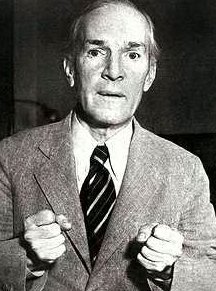Upton Sinclair
Upton Beall Sinclair Jr. (September 20, 1878 – November 25, 1968) was an American writer, political activist, and the 1934 Democratic Party nominee for Governor of California who wrote nearly 100 books and other works across several genres. Sinclair's work was well known and popular in the first half of the 20th century, and he won the Pulitzer Prize for Fiction in 1943.
Early Life[edit | edit source]
Upton Sinclair was born in Baltimore, Maryland, to Upton Beall Sinclair Sr. and Priscilla Harden. His family was originally from the Southern United States but had fallen on hard times, leading Sinclair to grow up in near poverty. This early exposure to the struggles of the working class would influence his later writings. Sinclair entered the City College of New York at the age of 14 and later attended Columbia University, where he began writing to pay for his tuition.
Career[edit | edit source]
Sinclair's breakthrough came in 1906 with the publication of The Jungle, a novel that exposed the harsh conditions and exploited lives of immigrants in the United States in Chicago and similar industrialized cities. The book was initially serialized in 1905 in the socialist newspaper Appeal to Reason, and its depiction of the unsanitary conditions in meatpacking plants led to public outrage and ultimately the passage of the Pure Food and Drug Act and the Meat Inspection Act in 1906.
Following The Jungle, Sinclair continued to write novels that explored social injustices and economic issues, such as King Coal (1917), which addressed the conditions of coal miners, and Oil! (1927), which inspired the 2007 film There Will Be Blood. Sinclair also wrote non-fiction works, including The Brass Check (1919), a critique of the American media system, and The Goose-Step (1923), an examination of American higher education.
Political Activism[edit | edit source]
Throughout his life, Sinclair was deeply involved in politics. He was a member of the Socialist Party of America and ran unsuccessfully for Congress as a Socialist in 1920. In 1934, he launched the End Poverty in California (EPIC) movement and ran for Governor of California as a Democrat, though he was defeated. Sinclair's political activities often influenced his writing and vice versa, with his works advocating for social reform and economic justice.
Legacy[edit | edit source]
Upton Sinclair's legacy is marked by his commitment to exposing social injustice and his contributions to literature and political thought. His work not only brought attention to the plight of the working class but also led to significant legislative reforms. Sinclair's influence extends beyond literature into the realms of journalism, politics, and social activism.
Selected Works[edit | edit source]
- The Jungle (1906)
- King Coal (1917)
- Oil! (1927)
- The Brass Check (1919)
- The Goose-Step (1923)
See Also[edit | edit source]
Search WikiMD
Ad.Tired of being Overweight? Try W8MD's physician weight loss program.
Semaglutide (Ozempic / Wegovy and Tirzepatide (Mounjaro / Zepbound) available.
Advertise on WikiMD
|
WikiMD's Wellness Encyclopedia |
| Let Food Be Thy Medicine Medicine Thy Food - Hippocrates |
Translate this page: - East Asian
中文,
日本,
한국어,
South Asian
हिन्दी,
தமிழ்,
తెలుగు,
Urdu,
ಕನ್ನಡ,
Southeast Asian
Indonesian,
Vietnamese,
Thai,
မြန်မာဘာသာ,
বাংলা
European
español,
Deutsch,
français,
Greek,
português do Brasil,
polski,
română,
русский,
Nederlands,
norsk,
svenska,
suomi,
Italian
Middle Eastern & African
عربى,
Turkish,
Persian,
Hebrew,
Afrikaans,
isiZulu,
Kiswahili,
Other
Bulgarian,
Hungarian,
Czech,
Swedish,
മലയാളം,
मराठी,
ਪੰਜਾਬੀ,
ગુજરાતી,
Portuguese,
Ukrainian
Medical Disclaimer: WikiMD is not a substitute for professional medical advice. The information on WikiMD is provided as an information resource only, may be incorrect, outdated or misleading, and is not to be used or relied on for any diagnostic or treatment purposes. Please consult your health care provider before making any healthcare decisions or for guidance about a specific medical condition. WikiMD expressly disclaims responsibility, and shall have no liability, for any damages, loss, injury, or liability whatsoever suffered as a result of your reliance on the information contained in this site. By visiting this site you agree to the foregoing terms and conditions, which may from time to time be changed or supplemented by WikiMD. If you do not agree to the foregoing terms and conditions, you should not enter or use this site. See full disclaimer.
Credits:Most images are courtesy of Wikimedia commons, and templates, categories Wikipedia, licensed under CC BY SA or similar.
Contributors: Prab R. Tumpati, MD

